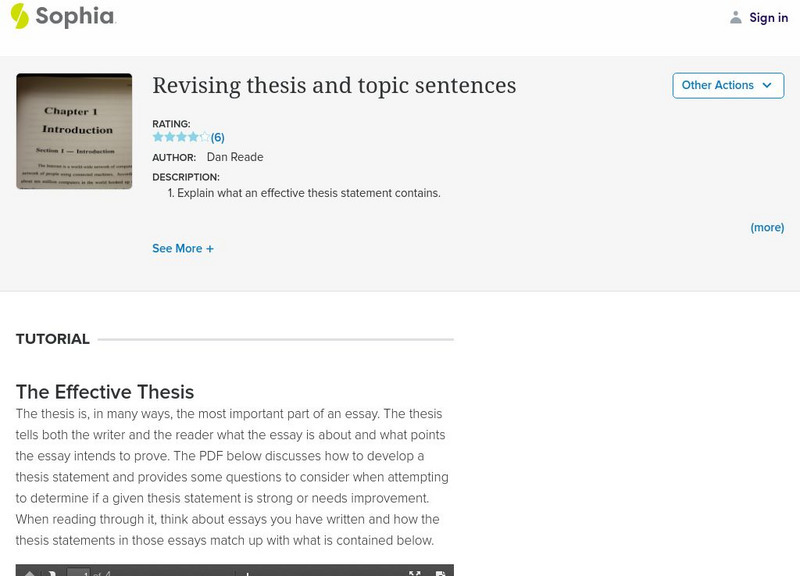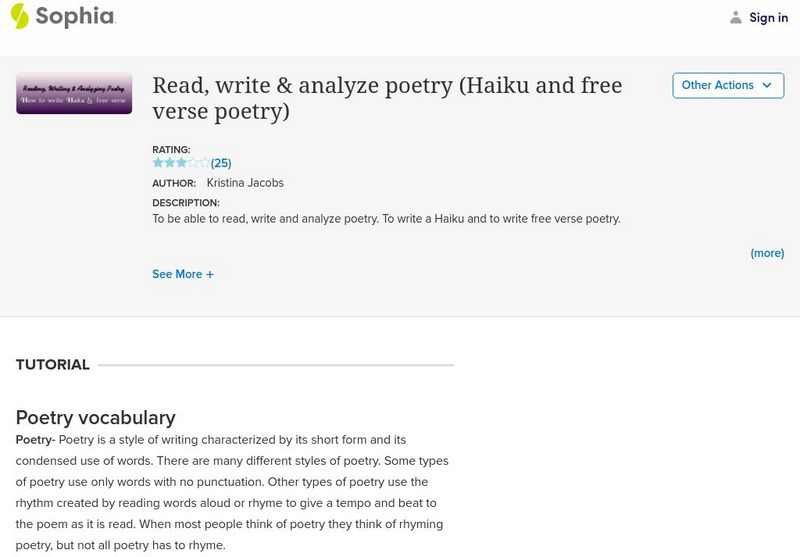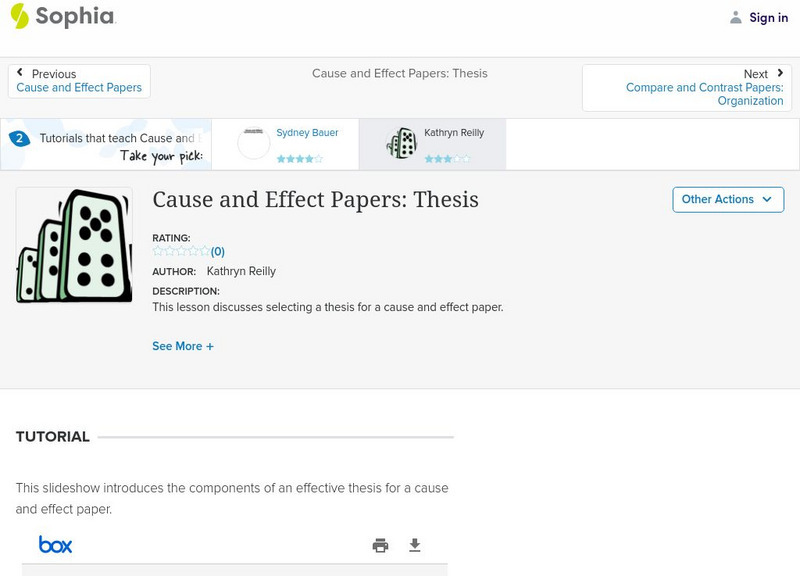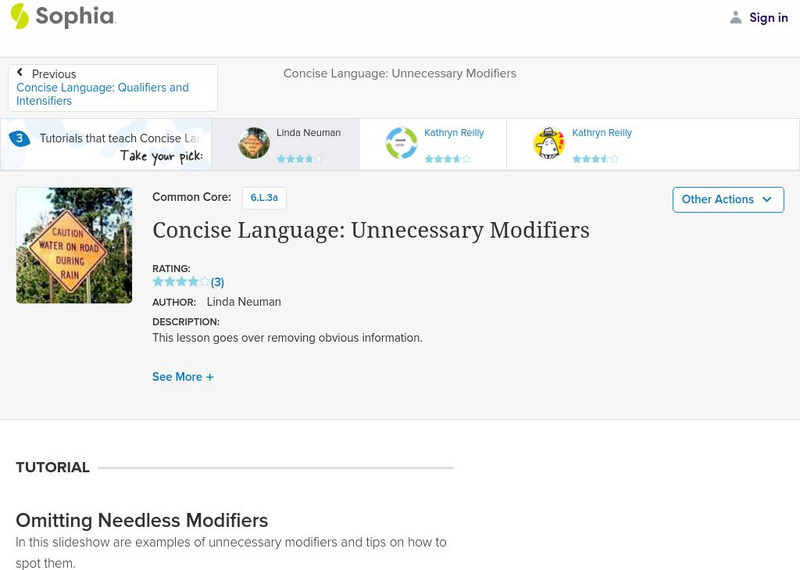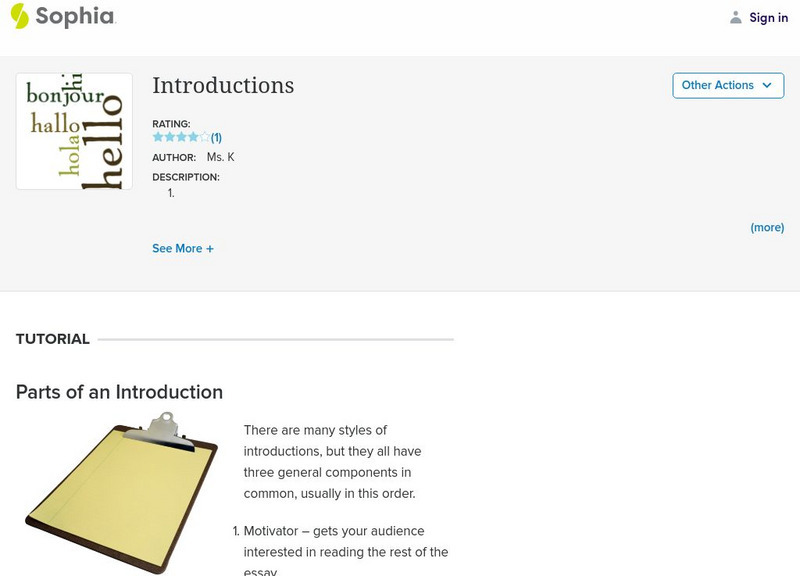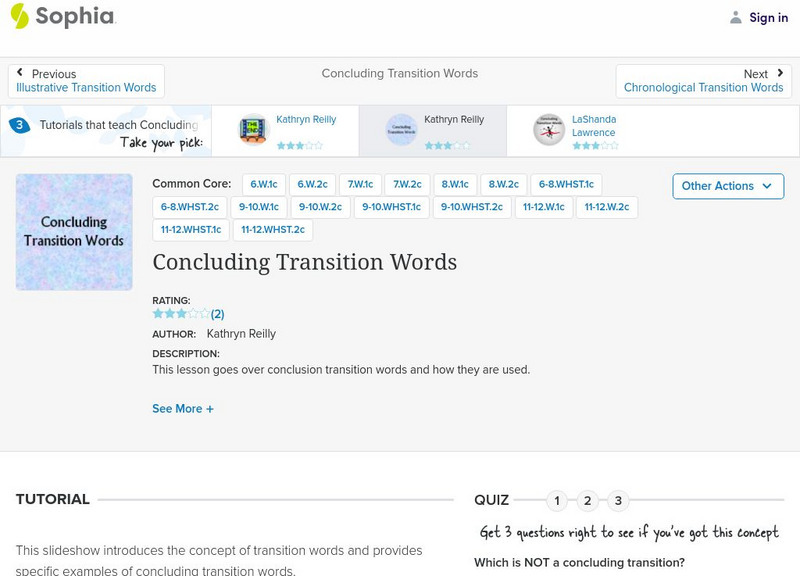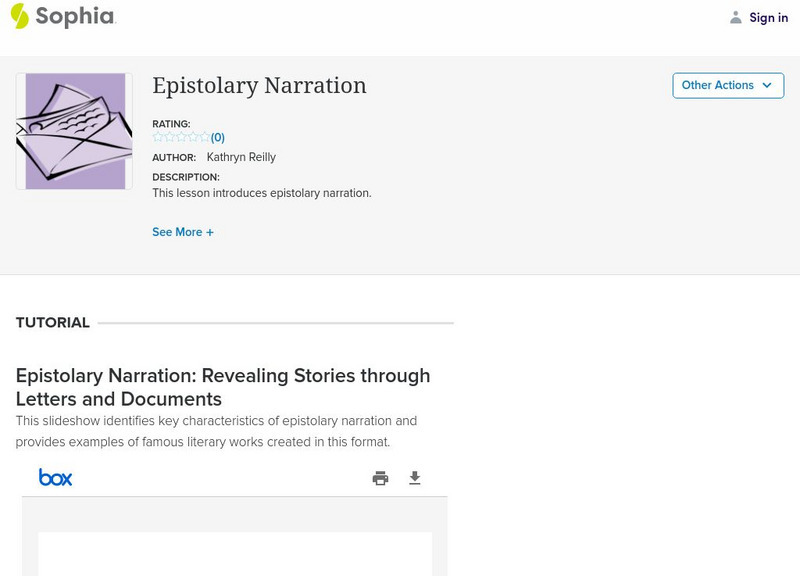Hi, what do you want to do?
Sophia Learning
Sophia: Revision Techniques: Using a Professor's Notes
This slideshow lesson focuses on revising using teacher comments. It discusses the advantages of teacher notes on rough drafts, how to use the notes to improve the final, examples from sections of marked student papers, editing and...
Sophia Learning
Sophia: Editing Techniques: Writing a Reverse Outline
This slideshow lesson focuses on writing a reverse outline as a post writing strategy for assessing your paper for weak or missing aspects. It explains how to create the outline using a rubric if available and provides a skeletal example...
Sophia Learning
Sophia: Revising Thesis and Topic Sentences
A series of notes and lessons focused on writing thesis statements and topic sentences. The lesson begins with a four-page downloadable PDF containing information about the function and form of a thesis statement as well as how to...
Sophia Learning
Sophia: Revision Technique: Thesis and Support
This slideshow lesson focuses on assessing and revising the thesis, topic sentences, and supporting details in a paper. It uses the analogy of the body: the thesis and topic sentences are the bones and the supporting details are the...
Sophia Learning
Sophia: Revision Techniques: Improving Flow
A ten-slide presentation explaining revision strategies that focus on improving the flow of a written text.
Sophia Learning
Sophia: Audience and Writing Style
This slideshow tutorial focuses on adjusting writing style to fit the audience. It looks at audience characteristics and discusses how to adapt the vocabulary, sentence style, and tone to fit them. It provides an example using the topic...
Sophia Learning
Sophia: Paper Writing: Transitions and Topic Sentences
This tutorial focuses on transitions including transitional devices, lists of common transition words and phrases, transitions between paragraphs with examples, and separate lists of transition words for descriptive, narrative, and...
Sophia Learning
Sophia: Read, Write, and Analyze Poetry (Haiku and Free Verse Poetry)
This tutorial focuses on poetry; it defines free verse and haiku, explains how to write each, and provides examples. It offers a slideshow which provides tips for beginners on how to read poetry, how to identify types of poetry, and how...
ReadWriteThink
Read Write Think: Persuasion Rubric
A printable four-point rubric to use when assessing a persuasive piece with a focus on organization, a goal or thesis, reasons/support, audience, word choice, visuals/delivery, and grammar/usage/mechanics. Directions on how to use this...
Sophia Learning
Sophia: Writing Effective Topic Sentences
This tutorial focuses on topic sentences using two slideshows. The first defines topic sentences, discusses purpose and placement, and provides a sample thesis statement followed by accompanying topic sentences samples. The second...
Sophia Learning
Sophia: Descriptive Papers: Organization
This slideshow lesson discusses the organization of descriptive papers. It reviews descriptive papers, lists the three most common organizational patterns: least to greatest, greatest to least, and chronological. Determining which order...
ReadWriteThink
Read Write Think: Conflict Map
This graphic organizer focuses on conflict: identifying the conflict, listing possible resolutions, and determining the cause of the conflict. It can be used as a reading tool, a writing organizer, or solving a real-life conflict.
ReadWriteThink
Read Write Think: Essay Rubric
A printable four-point rubric to use when evaluating essays for focus/details, organization, voice, word choice, and usage/mechanics. Directions on how to use this type of graphic organize as well as lists of teaching ideas are also...
Sophia Learning
Sophia: Cause and Effect Papers: Thesis
This slideshow lesson focuses on how to write an effective cause and effect thesis; it reviews cause and effect writing, lists signal words for cause and effect papers, explains what is required in the thesis, and provides three examples...
Sophia Learning
Sophia: Concise Language Adds Zest!
This slideshow focuses on how to revise writing using concise language by eliminating unnecessary words and redundancy, avoiding generic phrases, using active voice and familiar terms, and looking for just the right words to convey...
Sophia Learning
Sophia: Concise Langauage: Reframing Negatives
This slideshow lesson focuses on the reasons to reframe negatives in your writing and how to do so. It provides examples and suggests using negatives sparingly only to caution your reader.
Sophia Learning
Sophia: Concise Language: Wordiness
This slideshow lesson focuses on using concise language by eliminating wordy construction in writing. It explains why writing needs to be concise and ways to do so by eliminating unnecessary passive tense, wordy constructions, and words...
Sophia Learning
Sophia: Concise Language: Qualifiers and Intensifiers
This slideshow focuses on removing unnecessary qualifiers and intensifiers to make writing more concise. It defines each term, gives examples, shows how removing them does not affect sentence meaning, and provides a partial list of each.
Sophia Learning
Sophia: Concise Language: Unnecessay Modifiers
This slideshow lesson focuses on identifying unnecessary modifiers and removing them from your writing. Rule of thumb: if the adjective does not tell the reader something the noun absolutely cannot, eliminate it. It provides student...
Sophia Learning
Sophia: Introductions
This tutorial focuses on introductions; it lists and explains three common components of introductions: motivator, thesis, and blueprint. It provides a sample introduction with commentary showing each of the parts. It discusses the...
Sophia Learning
Sophia: Concluding Transition Words
This slideshow lesson focuses on the use of concluding transition words; it defines transition words and lists the categories. It explains when and how to use concluding transitions, provides a sample list of them, and offers sentence...
Sophia Learning
Sophia: Epistolary Narration
This slideshow focuses on epistolary narration, revealing a story through letters, documents, or diaries. It defines the term, explains what to look for to identify them, gives the two perspectives, and offers literary examples: C.S....
Sophia Learning
Sophia: Summarizing a Source
This slideshow focuses on summarizing a research source; it lists the uses for summary, and explains what a summary is and is not. It explains how to summarize a text and incorporate it into a paper.
Sophia Learning
Sophia: Topic Sentences
This slideshow lesson focuses on topic sentences; it defines them, gives the characteristics of effective topic sentences, tells what they are NOT, discusses how to create them, and provides examples of effective topic sentences.
Other popular searches
- Writing Focus
- Clear Focus Writing
- Writing Focus Statements
- Writing Focus Questions
- Writing Focus Coherence
- Maintaining Focus in Writing
- Central Focus in Writing
- Teaching Focus in Writing
- Scoring Focus of Writing
- Narrow the Writing Focus







